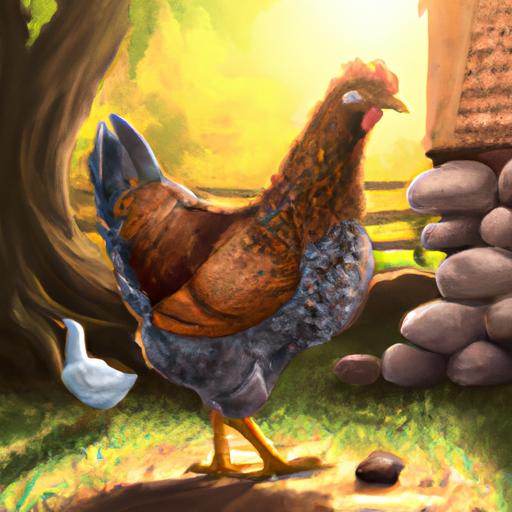Do chickens have their own version of a spa day? It turns out, they do! Chickens have a unique behavior called allopreening, which is a fancy term for when one chicken cleans another.
In this article, you’ll find out what allopreening is, why chickens do it, and how it helps keep them clean.
Plus, you’ll learn about the social benefits of allopreening and how it fits into the broader ways that chickens groom themselves.
Ready to find out more? Let’s dive in!
Table of Contents
Short Answer
Yes, chickens do clean each other.
This behavior is called allopreening and is usually done among related birds.
During allopreening, chickens will use their beaks to groom each other’s feathers and remove parasites or debris.
This behavior helps to keep their feathers in good condition and strengthens their bond with one another.
What is Allopreening?
Allopreening is a unique behavior displayed by chickens that involves one bird preening the feathers of another.
It is most often done by the dominant hen in the flock, and is seen as a way for chickens to strengthen the social bond between them.
Allopreening also helps keep the birds clean and healthy, as it removes dirt, parasites, and other debris from the feathers.
This behavior is not only seen in chickens, but in other species of birds as well.
Allopreening is a sign of trust and comfort between two birds and is often seen as a sign of affection.
Allopreening is an example of mutual grooming, which is a type of behavior in which two animals attend to each other’s hygiene needs.
This type of behavior is seen in many species, including primates, cats, dogs, and even some fish.
Allopreening is an interesting behavior, as it does not involve direct contact between the birds, but rather one bird preening the feathers of another.
This behavior is seen most often in chickens and is thought to be a way for chickens to strengthen the bond between them.
In addition to strengthen the bond between chickens, allopreening also helps to keep the birds clean and healthy.
By removing dirt, parasites, and other debris from the feathers, allopreening helps to prevent the spread of disease and keeps the birds in good health.
Allopreening is a form of communication between chickens, as it conveys a message of trust and comfort between the two birds.
It is also seen as a sign of affection and is a way for chickens to show that they care for one another.
Why Do Chickens Allopreen?

Chickens are social creatures and form close relationships with one another and will often engage in a behavior known as allopreening, which is a form of grooming.
This behavior is usually done by the dominant hen in a flock, as a way of strengthening the social bond between the two birds.
Allopreening also serves a practical purpose, as it helps keep the birds clean and healthy.
By preening each other’s feathers, chickens can remove dirt, parasites, and other debris that can accumulate on their feathers.
Allopreening is not only important for keeping the birds clean and healthy, but it also has other benefits.
For example, it helps to spread oils and other secretions that help to protect the feathers and keep them in good condition.
It can also help to reduce stress levels and can even be used as a form of communication between birds.
Allopreening can also be used as a form of bonding between chickens, as it is often seen in newly formed flocks as a way of establishing trust and familiarity.
In conclusion, allopreening is an important behavior for chickens, both for practical and social reasons.
It helps to keep the birds clean and healthy, while also providing a way for them to bond and strengthen their social relationships.
How Does Allopreening Help Keep Chickens Clean?
Allopreening is an important behavior among chickens that helps them to stay clean and healthy.
By preening each others feathers, chickens are able to remove dirt, parasites, and other debris that can accumulate on their feathers over time.
This behavior is usually done by the dominant hen in the flock and it serves to strengthen the social bond between the birds.
When a chicken preens another, it is essentially using its beak to comb through the feathers of the other bird.
This helps to remove any dirt, lice, or other debris that has built up on the feathers.
The bird that is preening also removes any parasites, such as mites, that may be present.
In addition, preening helps to keep the feathers in good condition by redistributing the natural oils that are produced by the bird’s body, which helps to keep the feathers waterproof and flexible.
Allopreening also helps to keep the birds healthy by removing any pathogens or parasites that may be present on the feathers.
This helps to reduce the risk of illness or disease being passed between the birds.
Additionally, allopreening helps to reduce stress levels in chickens.
This is because the act of preening releases endorphins, which can help to reduce stress and make the birds feel more relaxed.
Overall, allopreening is an important behavior among chickens that helps them to stay clean and healthy, as well as strengthens the bond between them.
It is a surprisingly simple yet effective way of helping chickens to stay in good condition and reduce the risk of illness or disease.
Social Benefits of Allopreening

Allopreening, the behavior in which chickens clean each other, is an important part of maintaining the social bond between chickens in the flock.
Through this behavior, the dominant hen in the flock is able to strengthen her bond with the other chickens, as well as ensure that the flock remains healthy and well-groomed.
The social benefits of allopreening come from the fact that it is a form of communication and bonding between chickens.
When a hen preens the feathers of another, it shows that they are comfortable enough to be close to one another and that they trust each other.
This is beneficial for the entire flock, as it helps to create a more harmonious environment.
Allopreening also encourages grooming behaviors, such as spreading the preen gland oil, which helps to keep the feathers in good condition.
This is important for the health and wellbeing of the chickens, as it helps to remove dirt, parasites, and other debris from the feathers.
Finally, allopreening can also help to establish a pecking order in the flock.
When a dominant hen preens the feathers of a subordinate, it is a sign that she is the leader of the flock.
This helps to keep the flock organized and ensures that the chickens know who is in charge.
In conclusion, allopreening is an important behavior for chickens, as it provides many social and health benefits.
It helps to strengthen the bond between chickens in the flock, encourages grooming behaviors, and can help to establish a pecking order.
Who Does the Allopreening?
When it comes to allopreening, or chickens cleaning each other, it is usually done by the dominant hen in the flock.
The dominant hen is typically the oldest and most experienced member of the flock, and is usually the leader when it comes to decision-making and group behavior.
Allopreening is not limited to the dominant hen, however; it is not uncommon for other birds in the flock to engage in the behavior as well.
The allopreening behavior is usually initiated by the dominant hen and is most often seen when the chickens are in a relaxed state.
The dominant hen will approach another bird in the flock and start preening its feathers.
This behavior is usually seen in the form of pecking and nibbling at the feathers of the other bird, in order to remove dirt, parasites, and other debris.
This behavior also serves to strengthen the social bond between the two birds.
The dominant hen will often use its beak to groom the other bird’s head and neck area, which is believed to help keep the flock together and foster trust between the birds.
Allopreening is not only done to keep the birds clean and healthy, but it is also believed to be a sign of affection and a way for the birds to show their bond.
The dominant hen may even preen the feathers of other birds in order to show dominance over them.
While allopreening serves to strengthen the social bond between birds, it can also be seen as a way for the dominant bird to assert its power over the flock.
What Are Other Ways Chickens Stay Clean?

Aside from allopreening, chickens have a few other methods they use to stay clean and healthy.
One of the most important is dust-bathing, which helps them to keep feathers free of dirt and parasites.
To do this, chickens will dig out a shallow hole in the ground and then cover themselves in a mix of dirt and sand.
The dirt absorbs oils and debris from their feathers, while the sand helps to remove any parasites.
This is a behavior chickens enjoy, and they will often take regular dust baths to keep themselves clean.
Another way chickens stay clean is by preening themselves.
This is similar to allopreening, but instead of one bird preening another, the bird will preen its own feathers.
This helps to remove dirt and parasites, as well as to redistribute the natural oils on the feathers that help keep them waterproof.
Finally, chickens have a few other behaviors which help to keep them clean.
They will often shake and fluff their feathers, which helps to remove dirt, and they will also peck and scratch at the ground to look for food and keep their feet clean.
All of these behaviors help to keep chickens healthy and free of parasites.
Disadvantages of Allopreening
Though allopreening between chickens can have many benefits, it also has a few drawbacks.
For instance, chickens that engage in allopreening can sometimes damage each other’s feathers, causing them to become frayed or torn.
Additionally, allopreening can be a form of aggression, as the dominant bird may be trying to assert its dominance over the other.
This can lead to stress and aggression in the flock.
Finally, allopreening can spread diseases from one bird to another, so it is important to keep your chickens healthy and free of parasites.
Final Thoughts
Who knew chickens can be so social? It turns out that chickens engage in a unique behavior known as allopreening, which involves one bird preening the feathers of another.
This helps the birds stay clean and healthy, as well as strengthens the social bond between members of the flock.
Allopreening is usually done by the dominant hen in the flock, but there are other methods chickens use to stay clean too, such as dust bathing.
While allopreening may have its disadvantages, it is ultimately an important behavior that helps keep chickens healthy and happy.
Now that you know more about allopreening, why not try to observe it in your own flock?

